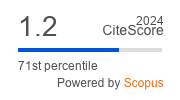Cognitive-epistemological, pragmatic, and psycholinguistic aspects of French interjections
DOI:
https://doi.org/10.29038/eejpl.2024.11.1.khaKeywords:
interjection, French , emotion, national world image, cognitive properties, pragmatic functions , psycholinguistic reactions, Marcel ProustAbstract
Interjections as a lexical and grammatical category still belong to the interdisciplinary lacunae, as they require the concretization of interpretations in various aspects: terminological definitions, pragmatic functions, cognitive reception by a speaker, and an adequate reproduction by an addressee. The current study aims to analyze the determinative interpretations and lexical and grammatical structures of interjections as a universal category used for determining communicative and pragmatic functions. A part of the psychological epic In Search of Lost Time/“A la recherche du temps perdu” – Albertine Disappears / “Albertine Disparue”) by Marcel Proust (1925) serves as a research material. Interjections, as a universal category, hold a prominent place in the lexical and grammatical system of languages. As a result of conducted quantitative analysis of interjections, the most common interjections discovered in the studied literary French-language text were one-word interjections, ‘oh!’ ‘ah!’, and ‘hélas!’, which, depending on the author’s illocutionary intention, their pragmatic function, as well as their position in the remark - at the beginning, in the middle or at the end - can create a range of meanings according to their emotional effect, such as hope, disappointment, doubt, embarrassment, confirmation, denial, request or call to action. Conversely, the texts frequently comprise interjection phrases that convey the processes of reflection on the inner experiences of a particular character and their psychological state. This, in turn, reveals the process of their personality development.
Disclosure Statement
The authors reported no potential conflicts of interest.
* Corresponding author: Oksana Rohach,
Downloads
References
Ameka, F. (1992). Interjections: The universal yet neglected part of speech. Journal of Pragmatics, 18, 101–118.
Barbéris, J.-M. (1995) L’interjection: de l’affect à la parade, et retour. Faits de Langue, 6, 93-104.
Bloomfield, L. (1933). Language. University of Chicago Presse.
Bondaruk, L. (2020) Symvol u bahatorivnevii strukturi tekstu: Marsel Prust, Moris Meterlink: monohrafiia [Symbol in the multilevel structure of a text]. Vezha-Druk.
Définition de «exlamation». Trésor de la Langue Française informatisé. Retrieved from https://www.lalanguefrancaise.com/dictionnaire/definition/exclamation
Dubois, C. (2000) La grammaire de l’exclamation : aspects théoriques. Français de référence et français québécois. Sherbrooke. Retrieved from https://www.collectionscanada.gc.ca/obj/s4/f2/dsk2/ftp01/MQ61741.pdf
Fedurko, M., Fedurko, O. (2021) Interiektyvy v movnii kartyni svitu poeta Petra Karmanskoho: sklad, semantyka, funktsionuvannia [Interjections in the language picture of the world of the poet Petro Karmansky: structure, semantics, functioning]. Ridne Slovo V Etnokulturnomu Vymiri, 6, 74–87.
Gladkova, A., Vanhatalo, U., Goddard, & Griffith, C. (2016). The semantics of interjections: An experimental study with natural semantic metalanguage. Applied Psycholinguistics, 37(4), 841–865. https://doi.org/10.1017/S0142716415000260
Goddard, C. (2014a). Interjections and emotion (with special reference to “surprise” and “disgust”). Emotion Review, 6, 53–63.
Kuprikova, H. (2015). Ukrainska mova: teoretychnyi blok [Ukrainian language: theoretical block]. NUA.
Matsko, L. (2004) Vyhuk. [Interjection] Ukrainska mova: Entsyklopediia. Kyiv, 64.
Matsko, L. (1981). Interiektyvy v Ukrainskii movi [Interjectives in the Ukrainian language]. Kyiv: KDPI.
Norrick, N. R. (2014). Interjections. Corpus pragmatic. Retrieved from https://doi.org/10.1017/CBO9781139057493
O’Connell, D. C., Kowal, S. (2010). Interjections in the Performance of Jane Austen’s Pride and Prejudice. Journal of Psycholinguist Research, 39. 285–304.
Olivier, C. (1986) Traitement pragmatique des interjections en français. Toulouse.
Pliushch, M. (2005). Hramatyka Ukrainskoi movy. Morfemika. Slovotvir. Morfolohiia. [Grammar of the Ukrainian language. Morphonology. Word-building. Morphology]. Part 1. Kyiv.
Rudder, O. de (1998). Ces mots qui font du bruit: Dictionnaire des onomatopées, interjections et autres vocables d’origine onomatopéique ou expressive de la langue française. Editions Jean-Claude Lattès.
Sytenko, O. (2021) Funktsiino-semantychna kharakterystyka vyhukiv v anhliiskii movi (na materiali romanu Diany Setterfild «Trynadtsiata kazka» [Functional and semantic description of interjections in the English language (on the material of Diane Setterfield’s novel “The Thirteenth tale”]. Aktualni Pytannia Vyvchennia Germanskykh, Romanskykh i Slovianskykh Mov i Literatur Ta Metodyky Vykladannia Inozemnykh Mov, 111–115.
Vykhovanets, I. (1988). Chastyny movy v semantyko-hramatychnomu aspekti [Parts of speech in the semantic and grammatical aspect]. Kyiv: Naukova Dumka.
Vykhovanets, I., Horodenska, K. (2004). Teoretychna morfolohiia Ukrainskoyi movy [Theoretical morphology of the Ukrainian language]. Kyiv.
Wharton, T. (2003). Interjections, language, and the ‘showing/saying’ continuum. Pragmatics & Cognition, 11, 39–91.
Wierzbicka, A. (1991). Cross-cultural pragmatics: The semantics of human interaction. Berlin: de Gruyter.
Wierzbicka, A. (1992) The semantics of interjections. Journal of Pragmatics, 18, 159-192.
Zvonska, L. (2017). Entsyklopedychnyi slovnyk klasychnykh mov [Encyclopedic dictionary of classical languages]. Kyivskyi Universytet.
Sources
Proust, M. (1925) La fugitige/ Albertine disparue. Nouvelle revue française. Paris.
Proust, M. (1930). The sweet Cheat Gone (The Fugitive). Transl. by C.K. Scott Moncrieff. Retrieved from https://uberty.org/wp-content/uploads/2015/12/proust-6.pdf
Downloads
Published
Issue
Section
License
Copyright (c) 2024 Tetiana Khaichevska, Liudmyla Bondaruk, Oksana Rohach

This work is licensed under a Creative Commons Attribution 4.0 International License.














 Creative Commons «Attribution» 4.0
Creative Commons «Attribution» 4.0